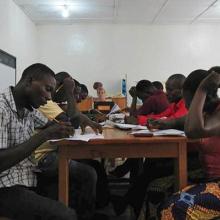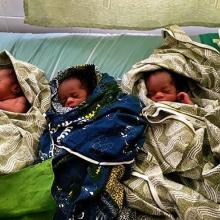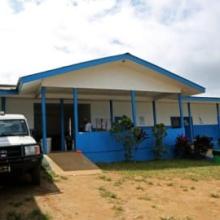Dr. Maxo Luma is a Haitian doctor who was working with Partners In Health in Haiti before coming to Canada in 2007 to continue his education. Dr. Luma is currently the TB Program Director for PIH Liberia, working to fight tuberculosis and support the national government as it rebuilds the country’s healthcare system. On a recent trip to Vancouver, we had the chance to speak with Dr. Luma about his work, his thoughts on global health and his Canada connections.
Q&A With Dr. Maxo Luma
What has your experience been like working for PIH Liberia?
I joined the PIH Liberia team three years ago. At first, I was appointed as the County Director for PIH in Grand Gedeh County—one of Liberia’s most remote counties along the border with the Ivory Coast, and where PIH started our Ebola response programming. My job included building strong relationships with county authorities in order to build trust and collaboration between PIH, the Ministry of Health and local leaders, and working hand in hand with the County Health Team to strengthen response and health programming. As per the philosophy of PIH, our role was to accompany the government in the goal of providing quality health services to Liberians, not to replace the government. Through this process, I led a team of international and local staff to help the Ministry of Health in the emergency response to the Ebola outbreak. At the same time, I was providing some expertise to the National Tuberculosis (TB) Program in the management of drug-resistant tuberculosis (DR-TB). Most urgently, in the midst of the Ebola epidemic, more than 25 patients on DR-TB treatment abandoned what was Liberia’s only treatment facility at the time. My experience in HIV/TB management in Haiti really allowed me to provide assistance to the National Program to go across the country and help return the majority of those patients to care.
How has your work changed in Liberia since the Ebola epidemic ended?
When the country was declared Ebola free, PIH’s work shifted to focus on health system strengthening. This includes training local staff, improving infrastructure, capacitating the health facilities with medicines and supplies needed to restore health services, and strengthening some of the clinical systems that can help the country build a more resilient health sector that will minimize the magnitude of future disasters like Ebola. We all understood that the more than 4,000 people who died during the Ebola outbreak did not really die from Ebola, but from a weak health system. Foreigners who caught Ebola were evacuated to other countries for treatment. They survived while Liberians continued to die from the disease. My role shifted to (fully) support the Ministry on TB/DR-TB management. Despite Liberia being one of the 30 highest-burden TB countries with an estimated more than 3,000 deaths per year, it remains a largely silent epidemic. For the past two years I have been working in close collaboration with the Ministry of Health and the National TB program to help the country expand DR-TB care throughout the country. Last year we opened the first decentralized DR-TB center in Maryland county to bring services closer to those who need them the most, and to decrease the costs associated with treatment. Through PIH I have built a team that co-manages the national referral center of TB. Thanks to the hard work of both the PIH and Ministry of Health teams, we now have over 100 patients in DR-TB care compared to the five patients we had at the end of the Ebola outbreak.
You have spoken a couple of times about collaboration. What does this look like in your work with PIH?
Unless we work as a team, there is no way we could accomplish what we do. We truly believe that every PIH employee is a family member. I consider the PIH team like a soccer team where every person has a crucial role to play and there is a strong interdependence between people and between programs. The nature of the PIH model is community-based, which makes it impossible to succeed without our community health workers (CHWs). They are the backbone of the model, linking community members to the health care system and keeping them in care. Because of the trust between CHWs who live in the community and other community leaders, it makes it easier to enter those communities to encourage people to seek care. I have found it easy to work when we all – doctors, nurses, community leaders – understand that our patients are in the center of everything. We consider ourselves to be servants and the patients our bosses. That is a common theme in our workplace. We are also there to stand behind the governments of the places where we work to propel them forward so they can achieve their goals. It’s an approach I carry through in my work together with the Ministry and the National TB Program. Our team believes it is the government’s responsibility to provide health care to citizens. It is not out place to do it for them, but to stand by them and help them do it.
What drew you to this type of work and to PIH?
My love story with PIH is long. I first contracted the “PIH bug” after I graduated from medical school when I worked at one of the PIH rural sites in Haiti. I was inspired by the social justice movement that was carried out there through the provision of quality health care to hard-to-reach people who could have otherwise died of treatable diseases such TB and HIV. What inspired me the most in this work was the fact that it was carried out within the public health system. I remember we would drive hours to make it to faraway communities to see people for all kinds of health issues and provide necessary accompaniment. Since then I have found a very strong connection between what I value as an individual and the values that are being carried out through the vision and mission of the organization. PIH is a channel for me to do meaningful and impactful work that I would never be able to do on my own. This makes me believe when one needs to do something good, as long as the will is there, it is always possible to find others who share common values who can help achieve common goals.
From working with PIH in Haiti, how did Vancouver become home?
I moved to Vancouver in 2007 to be with my wife who was studying medicine here. I started working at the University of British Columbia Faculty of Medicine as a medical advisor, where I facilitated group learning with first and second year medical students. I then chose to complete my Masters of Public Health at UBC. It was a great program that deepened my understanding of the work I was doing with PIH in Haiti and the science of delivery for public health programming. At UBC I had time to really think about the social determinants of the conditions my patients were dealing with, the ones that led them to fall sick and make them poorer and prevent them from enjoying the benefits of TB/HIV treatment. While studying and working at UBC I met very interesting people in the field of Public Health such as Dr. Jeannie Shoveller, who has been a great mentor as I continue to navigate my path in public health in BC and global health more broadly. I am still connected with the University, now serving as an adjunct professor to Professor Shoveller in the Global Health department.
So you were back and forth between Haiti and Vancouver. How did you end up working in Liberia?
I was on a conference call with Dr. Paul Farmer in March 2015 when I was working at the teaching hospital in Mirebalais, Haiti. This was a call between Dr. Farmer, Dr. Jim Kim, the head of the World Bank Group, and the Government of Guinea to strategize on how to get to “Ebola zero”, meaning zero new cases of Ebola. After the call, Dr. Farmer said to me, “ti Maxo mwen an, ou vle ale Guinee ak mwen? (“My little Maxo, would you consider coming to Guinea with me?”). To be honest, I did not know what to say and had to think on it. I saw how serious the epidemic was in West Africa and understood the rationale behind having PIHers with experience there to help build the team, as we understand the vision and mission of the organization. I felt the need to be there as a PIH soldier and public health professional. We believe we should be everywhere we are needed the most. With all this in mind, I chose to join the team in West Africa and started work in Liberia.
Can you tell me a story of someone or something that really stands out from your time working with PIH?
I have met so many interesting people in PIH in Liberia, in Haiti and the teams in US and Canada that it is difficult to pick one person. I would say one story that really resonates is of Paul, one of our patients who was diagnosed with drug-resistant TB in Liberia. This was before we opened the DR-TB centre in Maryland, so his only option was to travel to Liberia’s only treatment facility for DRTB, located more than 18 hours away in the capital (Monrovia) for the 8 months of the intensive treatment program where he was to receive injections every day. The challenge was that he was the sole breadwinner for a family of 15 people – it was an unimaginable decision for him and his family. He was sick with MDR-TB and needed treatment, but unwilling to go to Monrovia if it meant abandoning his family. What stands out the most in this story, however, remains the response of our team and MOH colleagues. Paul’s case was a watershed moment that propelled Liberia to start community-based treatment so that Paul and the hundred others like him can access the care and treatment they need without being forced to make the sort of difficult decisions between treatment and the well-being of themselves and their families. With this commitment to do whatever it takes and strong collaboration between our PIH and MOH teams, I am confident that Liberia can make great strides towards ending TB in the Country.


